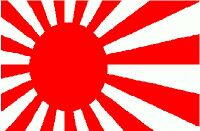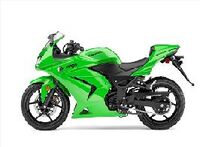Kawasaki
Kawasaki is a Japanese based motor company that specializes in the production of recreational motorcycles and four wheelers. The name Kawasaki translates to absolutely nothing, but recently has become synonymous for Asian food in Midwestern parts of the United States.
Introduction
The company was introduced in Tokyo, Japan, in the 1979. It's sole intention was to build the world's first non-gas powered chain of dirt bike. By 1981, they had succeeded.
Engineering[edit]
Dirt Bikes[edit]
The first Kawasaki dirt bikes were frail and fragile at the most. It took a highly trained rider to even hope to travel more than 100 yards before the axles broke from just the sheer weight of the rider himself. Soon heavily re-enforced frames created from light weight, extremely durable steel alloy. This combination would allow for a perfect combination of speed and strength.
Off Road 4x4[edit]
The Kawasaki four wheelers were extremely dangerous and caused a series of epileptic seizures in Japan. They have been known to be prone to spontaneously asplode all around the world.
Rice Intake System[edit]
In 1981 the engineers of Kawasaki invented a Rice Intake System that would altogether replace the need for gas. By breaking down the carbohydrates located within the rice, they were able harness it's energy that they needed. The newly discovered RIS also enabled for the rider to get 10,000 miles per gallon of rice, while loosing a conceivable amount of horsepower, all of it in fact. Researchers initially thought this would be a great way to save the common person tons of money annually.
Economic Factor[edit]
In Japan[edit]
Asian countries soon began to purchase as many of these motorbikes as Kawasaki could make. By 1984, Japan had almost completely eliminated the need for oil based products. With this huge economic shift, the Japanese Government was able to provide much more funding to the development of modern technology. With this advancement came many companies that still shape the world today, such as: Nintendo, Sony, Sega, Nokia, Mitsubishi, Motorola, Yamaha, and Simm's Restaurant.
In America[edit]
Initially, Republican law makers banned the sell of Kawasaki products within the United States; due to their fear that Kawasaki's success would put American automakers out of commission. The ban was proven unconstitutional in 1983, and was therefore lifted. But what they didn't expect was that few American's wanted the little rice burners because of their national love for pure power. The only people who still like them are 8 foot tall redheads and scrawny kids with pubes on their head instead of regular hair.
Advancements of the Rice Intake System[edit]
Rice Intake System MarkII[edit]
In 1992 Kawasaki began producing engines with the Rice Intake System MarkII. The RIS2 allowed the rice to burn at a cooler temperature, allowing better mileage and more horsepower.
Rice Intake System MarkIII[edit]
This one was made in 1997. The RIS3 completely eliminated pollution. In fact it actually purifies the air as it is used. This was one of the greatest automotive discoveries ever found.
Rice Intake System MarkIII Redux[edit]
The Rice Intake System MarkIII Redux, or RIS3R for short, was a modified version of the MarkIII that greatly increased speed and purification rate. Created in 2002, the RIC3R as by now almost completely reversed global warming, and either continues to make the world better each day, or is heading us toward an ice age.
Going Green[edit]
The term "Going Green" was taken from Kawasaki and it's many efforts to save the planet. The color of all Kawasaki products has been green since it was created in 1979. Not a grasshopper green, or a lime green, but more like a dark neon green. Kojiro Matsukata won a Noble Prize for his efforts in 2003. He was then killed by a Samurai with a cinder block.
Today[edit]
Currently Kawasaki is flourishing, even in the U.S., due to the rise of the price of gasoline. Their products have proven to be trustworthy and reliable for fans of all ages.




